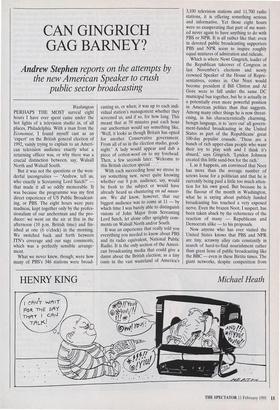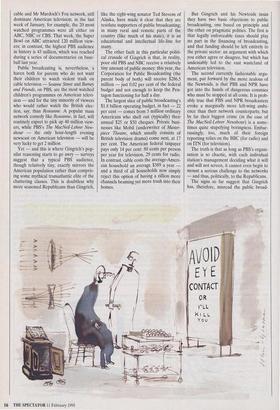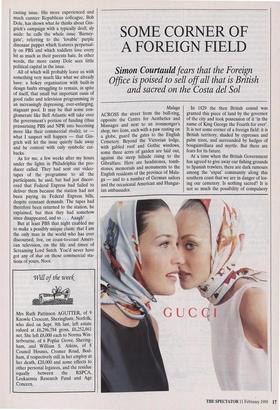CAN GINGRICH GAG BARNEY?
Andrew Stephen reports on the attempts by the new American Speaker to crush public sector broadcasting Washington PERHAPS THE MOST surreal eight hours I have ever spent came under the hot lights of a television studio in, of all places, Philadelphia. With a man from the Economist, I found myself cast as an `expert' on the British general election of 1992, vainly trying to explain to an Ameri- can television audience exactly what a returning officer was, or why there was a crucial distinction between, say, Walsall North and Walsall South.
But it was not the questions or the won- derful incongruities — 'Andrew, tell us, who exactly is Screaming Lord Sutch?' that made it all so oddly memorable. It was because the programme was my first direct experience of US Public Broadcast- ing, or PBS. The eight hours were pure madness, kept together only by the profes- sionalism of our anchorman and the pro- ducer: we went on the air at five in the afternoon (10 p.m. British time) and fin- ished at one (6 o'clock) in the morning. We switched back and forth between ITN's coverage and our sage comments, which was a perfectly sensible arrange- ment.
What we never knew, though, were how many of PBS's 346 stations were broad- casting us, or when; it was up to each indi- vidual station's management whether they screened us, and if so, for how long. This meant that at 59 minutes past each hour our anchorman would say something like, `Well, it looks as though Britain has opted for another Conservative government. From all of us in the election studio, good- night.' A lady would appear and dab a piece of cotton-wool on to my forehead. Then, a few seconds later: 'Welcome to this British election special . .
With each succeeding hour we strove to say something new, never quite knowing whether our 8 p.m. audience, say, would be fresh to the subject or would have already heard us chuntering on ad nause- am. We did know, however, that our biggest audience was to come at 11 — by which time I was barely able to distinguish visions of John Major from Screaming Lord Sutch, let alone offer sprightly com- ments on Walsall North and/or South.
It was an experience that really told you everything you needed to know about PBS and its radio equivalent, National Public Radio. It is the only section of the Ameri- can broadcasting media that could give a damn about the British election; as a tiny oasis in the vast wasteland of America's 3,100 television stations and 11,700 radio stations, it is offering something serious and informative. Yet those eight hours were so exasperating that part of me want- ed never again to have anything to do with PBS or NPR. It is all rather like that: even in devoted public broadcasting supporters PBS and NPR seem to inspire roughly equal mixtures of admiration and ridicule.
Which is where Newt Gingrich, leader of the Republican takeover of Congress in last November's elections and newly crowned Speaker of the House of Repre- sentatives, comes in. Our Noot would become president if Bill Clinton and Al Gore were to fall under the same DC municipal bus together, but he is actually in a potentially even more powerful position in American politics than that suggests. Among many other things he is now threat- ening, in his characteristically charming, benign language, is to 'zero out' all govern- ment-funded broadcasting in the United States as part of the Republicans' great 100-day populist crusade. 'These are a bunch of rich upper-class people who want their toy to play with and I think it's absurd,' says Gingrich. 'Lyndon Johnson created this little sand-box for the rich.'
I, as it happens, am convinced that Noot has more than the average number of screws loose for a politician and that he is currently being paid a little too much atten- tion for his own good. But because he is the flavour of the month in Washington, what he is saying about publicly funded broadcasting has touched a very exposed nerve. Even the brazen Noot, I suspect, has been taken aback by the vehemence of the reaction of many Republicans and Democrats alike — to his proposals.
Now anyone who has ever visited the United States knows that PBS and NPR are tiny, scrawny alley cats constantly in search of hard-to-find nourishment rather than great lions of public broadcasting like the BBC — even in these Birtite times. The giant networks, despite competition from cable and Mr Murdoch's Fox network, still dominate American television; in the last week of January, for example, the 20 most watched programmes were all either on ABC, NBC or CBS. That week, the Super Bowl on ABC attracted 120 million view- ers; in contrast, the highest PBS audience in history is 43 million, which was reached during a series of documentaries on base- ball last year.
Public broadcasting is, nevertheless, a haven both for parents who do not want their children to watch violent trash on cable television — Sesame Street and Barney and Friends, on PBS, are the most watched children's programmes on American televi- sion — and for the tiny minority of viewers who would rather watch the British elec- tion, say, than Roseanne. A popular mass network comedy like Roseanne, in fact, will routinely expect to pick up 40 million view- ers, while PBS's The MacNeil-Lehrer New- shour — the only hour-length evening newscast on American television — will be very lucky to get 2 million.
Yet — and this is where Gingrich's pop- ulist reasoning starts to go awry — surveys suggest that a typical PBS audience, though relatively tiny, exactly minors the American population rather than compris- ing some mythical transatlantic elite of the chattering classes. This is doubtless why more seasoned Republicans than Gingrich, like the right-wing senator Ted Stevens of Alaska, have made it clear that they are resolute supporters of public broadcasting; in many rural and remote parts of the country (like much of his state), it is an educational and intellectual life-line for many.
The other fault in this particular politi- cal crusade of Gingrich is that, in reality, poor old PBS and NBC receive a relatively tiny amount of public money: this year, the Corporation for Public Broadcasting (the parent body of both) will receive $286.5 million just 0.02 per cent of the federal budget and not enough to keep the Pen- tagon functioning for half a day.
The largest slice of public broadcasting's $1.8 billion operating budget, in fact — 22 per cent — comes from 5 million ordinary Americans who shell out (typically) their annual $25 or $50 cheques. Private busi- nesses like Mobil (underwriter of Master- piece Theatre, which usually consists of British television drama) come next, at 17 per cent. The American federal taxpayer pays only 14 per cent: 80 cents per person per year for television, 29 cents for radio. In contrast, cable costs the average•Ameri- can household an average $389 a year and a third of all households now simply reject this option of having a zillion more channels beaming yet more trash into their homes. But Gingrich and his Newtoids insist they have two basic objections to public broadcasting, one based on principle and the other on pragmatic politics. The first is that legally enforceable taxes should play no part in the financing of broadcasting, and that funding should be left entirely to the private sector: an argument with which you either agree or disagree, but which has undeniably led to the vast wasteland of American television.
The second currently fashionable argu- ment, put forward by the more zealous of the Newtoids, is that PBS and NPR have got into the hands of dangerous commies who must be stopped at all costs. It is prob- ably true that PBS and NPR broadcasters evoke a marginally more left-wing ambi- ence than their network counterparts; but by far their biggest crime (in the case of The MacNeil-Lehrer Newshour) is a some- times quite stupefying boringness. Embar- rassingly, too, much of their foreign reporting relies on the BBC (for radio) and on ITN (for television).
The truth is that as long as PBS's organi- sation is so chaotic, with each individual station's management deciding what it will and will not screen, it cannot even begin to mount a serious challenge to the networks — and thus, politically, to the Republicans.
The signs so far suggest that Gingrich has, therefore, misread the public broad- casting issue. His more experienced and much cannier Republican colleague, Bob Dole, has shown what he thinks about Gin- grich's campaign with a typically droll, sly aside: he calls the whole issue 'Barney- gate', referring to the 'lovable' purple dinosaur puppet which features perpetual- ly on PBS and which toddlers love every bit as much as their parents hate. In other words, the more canny Dole sees little political capital in the issue.
All of which will probably leave us with something very much like what we already have: a hokey organisation with built-in design faults struggling to remain, in spite of itself, that small but important oasis of good radio and television programming in an increasingly depressing, ever-enlarging, stagnant pool. It may be that some con- glomerate like Bell Atlantic will take over the government's portion of funding (thus pressurising PBS and NPR into becoming more like their commercial rivals); or what I suspect will happen — that Gin- grich will let the issue quietly fade away and be content with only symbolic cut- backs.
As for me, a few weeks after my hours under the lights in Philadelphia the pro- ducer called. They had sent out video- tapes of the programme to all the participants, he said, but had just discov- ered that Federal Express had failed to deliver them because the station had not been paying its Federal Express bills, despite constant demands. The tapes had therefore been returned to the station, he explained, but then they had somehow since disappeared, and so . . . Aaagh!
But at least PBS that night enabled me to make a possibly unique claim: that I am the only man in the world who has ever discoursed, live, on coast-to-coast Ameri- can television, on the life and times of Screaming Lord Sutch. You'd never have got any of that on those commercial sta- tions of yours, Noot.




























































 Previous page
Previous page